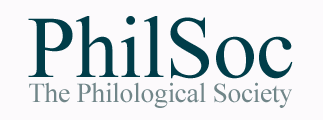Remote meeting 4.15pm BST
Previous Seasons Meetings
PhilSoc welcomes proposals for papers to be read at meetings. Proposals should be forwarded to the Honorary Secretary (contact details on the Contact page). Papers may be on any topic falling within the scope of PhilSoc's interests, but speakers are asked to bear in mind that the audience will represent a wide range of linguistic interests, and papers should therefore be accessible to non-specialists.
October 2021
The Early French Press: Examining a New Text Type in Historical Linguistics
Mairi McLaughlin (UC Berkeley)
Lecture & AGM
A formal theory of idiolect and its forensic applications
Dr Andrea Nini (Manchester)
May 2021
Contact in the Past: how contact has shaped language in society
Tamsin Blaxter (Cambridge), Victoria Beatrix Fendel (Oxford), Jonathan Kasstan (Westminster), Robin Meyer (Lausanne)
Panel discussion (remote meeting)
March 2021
Workshop on Prominent Possessors
Workshop on Prominent Possessors (organised by SOAS University of London, Murray Edwards College, Cambridge and Surrey Morphology Group)
February 2021
From grammaticalization to agrammatism: a functional approach to grammar
Kasper Boye (Copenhagen)
Remote meeting
January 2021
Reconstructing the accents of Old Celtic: stress without accent marks
Patrizia de Bernardo Stempel (University of the Basque Country)
Remote meeting: please register for the meeting here. Guests welcome.
November 2020
Workshop on Approaches to lexical variation (organised by University of Sussex)
Postgraduate researchers
Presentations by postgraduate researchers Rhys Sandow (Sussex), Sandra Young (Brighton), and Mary Edward (Brighton), followed by round table discussion, chaired by Dr Justyna Robinson
October 2020
A modular perspective on consonant alternations Finnish and Amuzgo stem formation
Dr Yuni Kim (Essex)
The next meeting of PhilSoc will be held remotely using Zoom. It will take place on Friday 23 October 2020 at 4.15pm (BST). Dr Yuni Kim (Essex) will speak on ‘A modular perspective on consonant alternations in Finnish and Amuzgo stem formation’. We will inform you about registration details closer to the talk.
This paper examines the division of labour between phonology and morphology in the stem allomorphy of two typologically different languages, Amuzgo (Oto-Manguean) and Finnish (Uralic). Both exhibit complex systems of stem-consonant alternations that, depending on the specific consonant and/or lexical item involved, run the gamut from phonologically transparent to apparently arbitrary in identical morphological contexts. By factoring out productive phonological processes, we can establish a lexical continuum from single underlying stems, to stem allomorphs connected by unproductive phonological rules, to stem-allomorph sets whose relationships cannot be mapped by conventional formal operations of phonology. For Amuzgo noun plurals, the identification of purely phonological processes reduces the patterns to a core of n- prefixation plus the alternations ? ~ k and ts/t?/w ~ Ø. I discuss the extent to which these quasi-phonological alternations can be understood theoretically in terms of abstract scales (Mortensen 2006). In Finnish verbs, there are many classes of exceptions (some surface, some deeper) to the basic phonological conditions on consonant gradation, along with parallels to other stem alternations that fall outside the gradation system. For these cases, I adopt the stratal framework of Bermúdez-Otero (2012, 2013), in particular the twin mechanisms of stem storage and lexical redundancy rules, to capture generalizations without placing disproportionate burden on either the phonology or the lexicon.
The President’s lecture and AGM
Converging evidence for morpho-phonological pertinacity: diachrony and experimental psycholinguistics
Prof. Aditi Lahiri
The AGM of PhilSoc will be held remotely on Saturday 13 June at 4.00 p.m. BST, replacing the planned event at Newnham College (Cambridge). It will conclude with the President’s Lecture at 5.00 p.m. BST, scheduled as a separate remote event. Prof. Aditi Lahiri will speak on ‘Converging evidence for morpho-phonological pertinacity: diachrony and experimental psycholinguistics’. All welcome (including guests). Please register here.
Remote meeting
May 2020
Modelling the development of the morphologically hybrid nature of the Bantu Final Vowels
Prof. Jeff Good (University of Buffalo)
The next meeting of PhilSoc, originally scheduled at SOAS University of London, will be held remotely using Zoom. It will take place on Friday 1 May 2020 at 4pm (BST). Prof. Jeff Good (University of Buffalo) will speak on ‘Modelling the development of the morphologically hybrid nature of the Bantu Final Vowels’.
To register, please sign up here. You will need to have Zoom on your device and will be sent a link before the meeting.
Remote meeting

